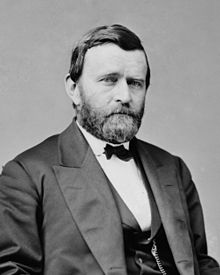
Back رئاسة يوليسيس جرانت Arabic Kabinett Grant German Présidence de Ulysses S. Grant French Presidenza di Ulysses S. Grant Italian Kabinet-Grant Dutch Gabinet Ulyssesa Granta Polish
This article may be too long to read and navigate comfortably. (November 2024) |
 | |
| Presidency of Ulysses S. Grant March 4, 1869 – March 4, 1877 | |
| Cabinet | See list |
|---|---|
| Party | Republican |
| Election | |
| Seat | White House |
|
| |
| ||
|---|---|---|
|
Personal 18th President of the United States Presidential campaigns
 |
||
The presidency of Ulysses S. Grant began on March 4, 1869, when Ulysses S. Grant was inaugurated as the 18th President of the United States, and ended on March 4, 1877. The Reconstruction era took place during Grant's two terms of office. The Ku Klux Klan caused widespread violence throughout the South against African Americans. By 1870, all former Confederate states had been readmitted into the United States and were represented in Congress; however, Democrats and former slave owners refused to accept that freedmen were citizens who were granted suffrage by the Fifteenth Amendment, which prompted Congress to pass three Force Acts to allow the federal government to intervene when states failed to protect former slaves' rights. Following an escalation of Klan violence in the late 1860s, Grant and his attorney general, Amos T. Akerman, head of the newly created Department of Justice, began a crackdown on Klan activity in the South, starting in South Carolina, where Grant sent federal troops to capture Klan members. This led the Klan to demobilize and helped ensure fair elections in 1872. He was succeeded by fellow Republican Rutherford B. Hayes, who won the 1876 presidential election.
Rather than develop a cadre of trustworthy political advisers, Grant was self-reliant in choosing his cabinet. He relied heavily on former Army associates, who had a thin understanding of politics and a weak sense of civilian ethics. Numerous scandals plagued his administration, including allegations of bribery, fraud, and cronyism. Grant did respond to corruption charges. At times, he appointed reformers, such as for the prosecution of the Whiskey Ring. Additionally, Grant advanced the cause of Civil Service Reform, more than any president before him, creating America's first Civil Service Commission. In 1872, Grant signed into law an Act of Congress that established Yellowstone National Park, the nation's first National Park.
The United States was at peace with the world throughout Grant's eight years in office, but his handling of foreign policy was uneven. Tensions with Native American tribes in the West continued. Under Secretary of State Hamilton Fish, the Treaty of Washington restored relations with Britain and resolved the contentious Alabama Claims, while the Virginius Affair with Spain was settled peacefully. Grant attempted to annex the Caribbean island of Santo Domingo, but the annexation was blocked by powerful Senator, Charles Sumner. Grant's presidential reputation improved during the 21st Century due to Grant's enforcement of civil rights for blacks.

